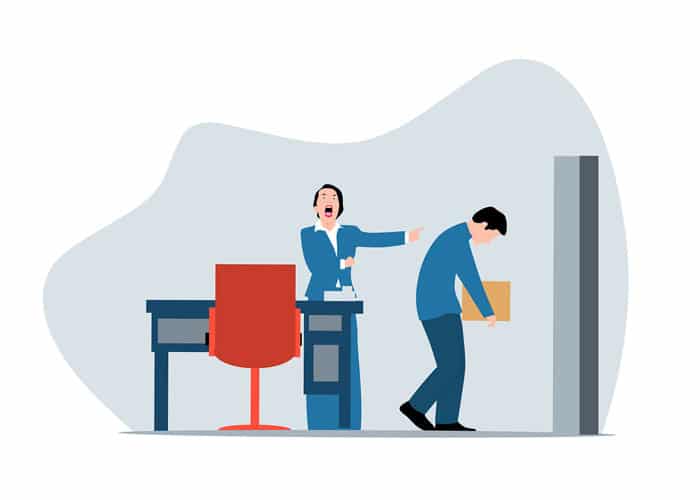
Getting fired from a job can be a harrowing experience, especially since at times the reasons for the sack may be unclear to you at the initial stage.
Certain organizations may not likely give a reason for fear of the legal implications of firing a staff with cause, or at best they will provide a flimsy excuse to back the action.
How are you going to know when your behaviors are likely to get you in trouble with the management, and how to get by it?
There is always a reason for letting go of an employee, often due to personal issues or mistakes carried out by the employee directly or indirectly.
No employer wakes up and decides to fire an employee. Such decisions are made especially with the interests of the employer and the image of the organization put into consideration.
The common picture is usually of being called into your Boss’ office, and finding one or more persons seated already, and you hear statements like; “…You have been called to discuss your termination from this organization.”
It may be presented with reasons like “… The economy is affecting the sustenance of the organization… we need to downsize”, “…you are dismissed without cause”, “…we feel you are no longer what we want.”
Below is a list of common reasons why organizations may no longer need your services:
- Underperformance: Companies are in business to make money, and anyone not thought to be making money for a company, or in the habit of making bad decisions for the company cannot last long in that organization.
Taking a look at your performance periodically, and knowing if you have been reaching or exceeding the expectations of your company for your position can help you retain that job.
However, if you feel you have been performing below expectations, you need to examine the cause; either it’s the company’s misdoings, or your oversight, and look for ways to correct it.
If there are others in similar roles in the organization that have attained higher levels of success, you can find out what they are doing that you are missing, and fix it.
- Bad attitudes or habits: Companies are putting more attention to maintaining a culture, or a professional lifestyle, and you don’t want to be messing with your company’s good looks.
If you cannot fit into the company’s culture, or attempt to, you can’t last long there.
Exhibiting contrary attitudes to what your firm represents, or belittling them in the eyes of their publics may also guarantee a fast trip back to unemployment.
Attitudes like sleeping, looking, and actually being idle; leaving your work station without permission, and not doing a task right, or even not heeding advice from superiors could get you fired fast.
If you come in daily with a negative attitude, or you are in the habit of being late, frequently missing work (even for a good cause), or showing any sign of dis-interest or non-commitment to your job; spending time gossiping about anything, including your superiors and company, your timer in that organization may be nearing its end.
While it is often difficult, it is advisable to have an outsider’s view of your work and behavior in the organization, to access if you have been committing any of the above acts or habits detrimental to the image of your company.
- Budget cut/Downsizing: This bad luck often face people at some point or another in an organization’s business life. While this may not have been the fault of the person affected, it is none the less an attitude –by companies owing majorly to bad business economy or lack of the usual funding.
It becomes painful if you do not measure up to a higher level of importance to your organization. This happens if you are part of a newer member of the organization, or a low-level staff, or even a disposable one.
Perhaps, you didn’t have enough time to prove your indispensability to your superiors, and when someone is needed to go, and it was you. This leaves one wondering why bosses are usually not sacked!
Even if a budget cut or down-sizing affected your company, and so many others like yourself were laid off, it does not make for any consolation in the confusion process, and it is strongly advised that you seat down and access yourself and your performance to the organization and find out ways in which you can be better.
That you were fired does not mean it was your fault. But it causes no harm to strive to be better for the sake of the future.
Conclusion:
As an employee, you must know that hiring and firing are part of what to expect at the work place.
However, to avoid being fired easily, you need to take the reasons why people get sacked from work that have been shared above seriously, and always strive to improve your performance at work, thereby making yourself so valuable to your employers that they wouldn’t want to let you go even when they are downsizing.




